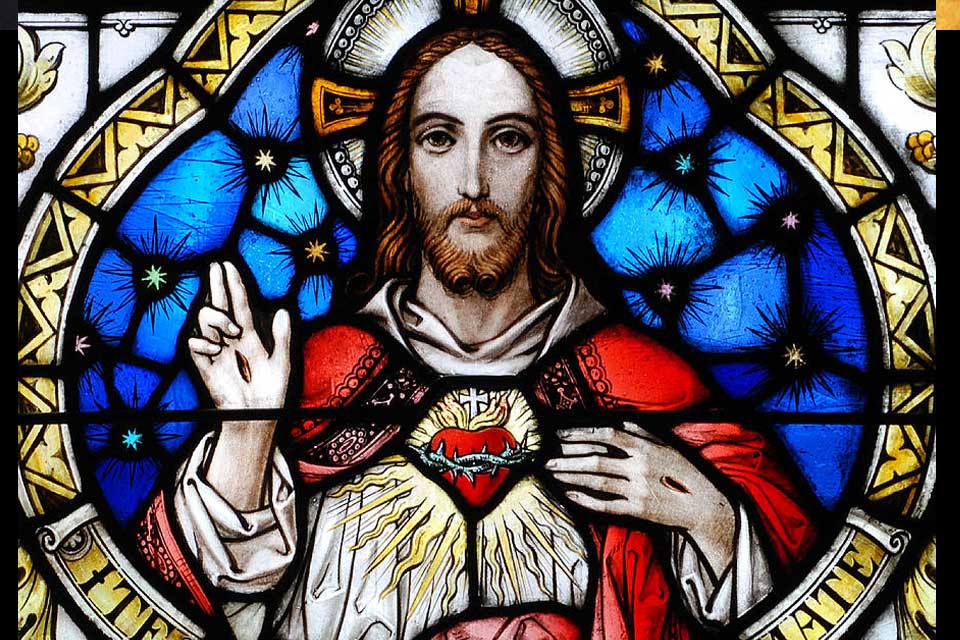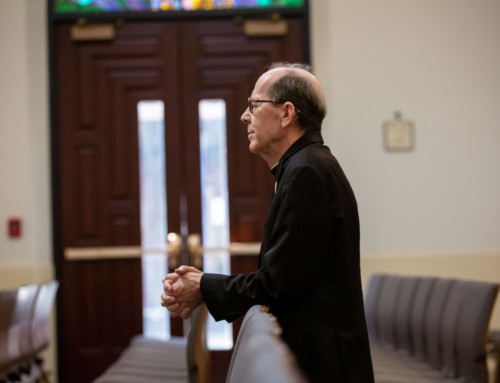The Son’s Complete Trust of His Father
Following is the prepared text for Bishop Olmsted’s homily for the fifth Sunday of Easter.
May 15, 2022
“When Judas had left them, Jesus said, ‘Now is the Son of Man glorified and God is glorified in Him” (John 13:31).
Jesus turned the moment of Judas’ betrayal into the hour that redeemed the world. He transformed what seemed like the triumph of evil into the victory of His self-sacrifice on the Cross. Jesus’ complete trust in His Father’s love revealed in the fullest way the nature of God: “God is love, and whoever remains in love remains in God and God in him”(1 John 4:16).
It was strong faith in the Risen Christ that brought to glory the saints who are honored in the windows of this chapel. And it is faith in the same victory of Christ’s love that you and I celebrate at every Sacrifice of the Mass.
Forty-four years ago, when John Paul II was elected Successor of Peter, he electrified the world with his words, born of deep trust in Christ, “Be not afraid! Be not afraid to welcome Christ into your life!” Papal biographer, George Weigel, wrote of him (Vol 2, p. 371), “…the depth and intensity of his belief in the liberating power of Christ’s love was the deepest taproot of his papal accomplishments, because it was the deepest wellspring of his life and his thought.” Weigel also pointed out (Ibid, p. 475), “…one striking characteristic of John Paul II’s discipleship…was his capacity to inspire others to new depths of faith—faith in God, faith in Christ, faith in the Church.”
This is the mission that you and I share today: faith in the Risen Christ sets us apart from the world for the sake of the world. With lively faith in Christ, which is the same as deep trust in His love, we can suffer hardships and not lose hope.
We see this in Paul and Barnabas in our First Reading today: Paul and Barnabas “returned to Lystra and to Iconium and to Antioch…” (Acts 14:21-27)
Lystra, Iconium, Antioch—we are told the names of these towns because of how Paul and Barnabas had been treated there. At Iconium, after teaching there for only a brief time, great numbers came to believe in Jesus; but some jealous leaders of the Jewish synagogue attempted “to attack and stone Barnabas and Paul;” and they were forced to flee (Acts 14:5ff). At Lystra, Paul taught the word of God, and many believed and were baptized; but out of jealousy, some leaders of the local synagogue “stoned Paul and dragged him out of the city, supposing he was dead” (14:19ff). But Paul recovered from his wounds, and with Barnabas he moved on to other towns to witness to the love of Jesus. At Antioch in Pisidia, after initial success in handing on the Gospel, accompanied by great rejoicing among eager new converts, Paul “suffered violent abuse” at the hands of influential women and men (13:50ff). So, we can see good reasons why Paul and Barnabas retraced their steps to Lystra, Iconium, and Antioch. They knew that the new followers of Christ in these towns were enthusiastic about the gift of faith and were striving to persevere in the face of fearsome threats. Barnabas and Paul also knew that these new followers of Christ needed their apostolic support as they were facing great hardships for their faith in Jesus.
As the Bishop of Phoenix, a similar privilege and responsibility falls to me. In a time of increasing attacks on the Catholic faith, your witness of strong faith in Christ is as vital for the Kingdom of God today as it was 2000 years ago. The witness of the laity is needed today in the face of grave threats to marriage and family, to the dignity and right to life of every human being, to the rights of conscience, and so forth.
A few years ago, Pope Francis said,
“…Some laity begin to believe the fundamental service God asks of them is to become greeters, lectors, or extraordinary ministers of Holy Communion at Church. Rather, the call is to live and spread the faith in their families, workplaces, schools, neighborhoods and beyond… The layperson has to live as a layperson, to be a leaven of the love of God in society itself…to create and sow hope, to proclaim the faith, not from a pulpit but from his everyday life. And like all of us, the layperson is called to carry his daily cross, the cross of the layperson.”
Pope Francis is not, to be sure, opposed to the laity serving as lectors or ushers and contributing to the good order and beauty of the Sacred Liturgy. But none of these should ever be mistaken as the primary ways that the laity bear witness to Christ.
We need married couples who live with gratitude the gift of their faith in Christ, even in the face of hardship; we need children like the two children of Fatima behind the altar of this chapel.
We need professionals like Giana Beretta Molla, medical doctor, wife, and mother who risked her own life for the sake of her last child; we need millennials like Frederic Ozanam, who founded the St Vincent de Paul Society when he was a university student in Paris. While we clergy have a necessary mission in the Church and society, Christ calls the laity to be the leaven of God’s truth and the spark of His love within their homes and in the larger society, living the faith in the ordinary circumstances of life.
The words of Paul and Barnabas still ring true in our day: “It is necessary to undergo many hardships to enter the Kingdom of God.”
In the Gospel today, Jesus says, “As I have loved you, so you also should love one another. This is how all will know that you are my disciples, if you have love for one another” (Jn 13:34). May others see in us a joyful love of Jesus.






